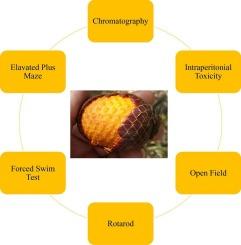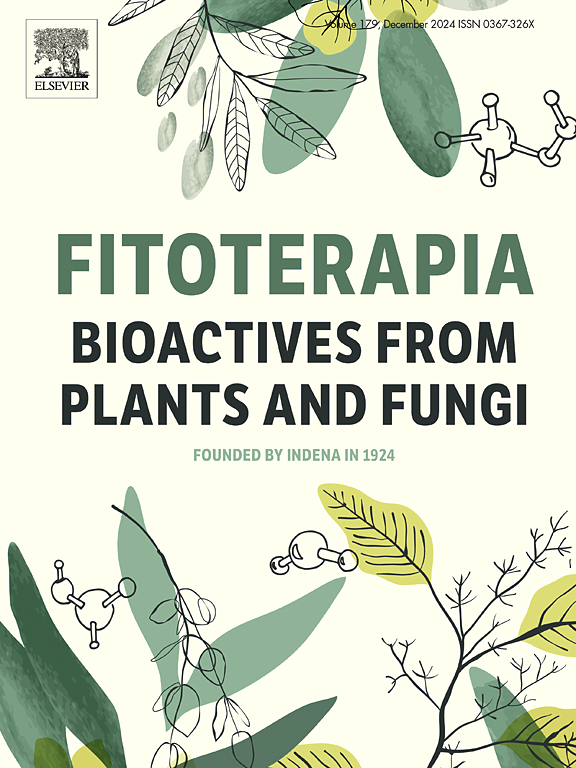Mauritia flexuosa L.F.(buriti)固定果肉油的植物化学特征、毒性和中枢效应药理学概况。
IF 2.5
3区 医学
Q3 CHEMISTRY, MEDICINAL
引用次数: 0
摘要
焦虑症和抑郁症是过去几十年来呈指数增长的精神疾病。精神药理学的出现试图缓解这些疾病的症状;然而,副作用和达到预期效果所需的时间是减少寻求和坚持治疗的因素。为了改变这种状况,人们一直在寻找能够改善这些药物的疗效并减少其不良反应的新化合物。为此,人们广泛使用药用植物。Mauritia flexuosa F.L.是一种在巴西发病率很高的棕榈树,由于其所有部分都可以使用,因此被列为重点研究对象。本研究的目的是评估从布尔提棕榈果实中提取的固定油对抑郁和焦虑模型的影响。此外,还研究了这种油的植物化学成分及其毒性。实验包括开阔地、旋转木马、强迫游泳和高架加迷宫测试。结果表明,布里提棕榈的固定油中含有 18 种化合物,其中主要是依来地酸,并且没有显示出毒性迹象。不过,它在开阔地试验中表现出可能的刺激活性,而在旋转木马试验中对运动系统没有影响。此外,它在强迫游泳试验中表现出类似抗抑郁的效果,但在高架加迷宫试验中表现出类似焦虑的效果。因此,布里提油有可能被用于辅助治疗焦虑症和抑郁症的新配方中。本文章由计算机程序翻译,如有差异,请以英文原文为准。

Phytochemical characterization, toxicity and pharmacological profile of the central effects of the fixed fruit pulp oil of Mauritia flexuosa L.F. (buriti)
Anxiety and depression are mental disorders that have been exponentially increasing over the last decades. Psychopharmacology emerged to try to alleviate the symptoms of these disorders; however, the side effects and the time it takes to achieve the desired effect are factors that decrease the search for and adherence to treatment. To remedy this situation, new compounds capable of improving the performance of these medications and reducing their adverse effects have been sought. The use of medicinal plants has been widely employed for this purpose. Mauritia flexuosa F.L., a palm tree with high incidence in Brazil, has been heavily targeted as all its parts are usable. The objective of this study is to evaluate the effects of fixed oil from the fruit of the buriti palm in models of depression and anxiety. The phytochemical profile of this oil and its toxicity were also investigated. The experiments conducted included the open field, rotarod, forced swim, and elevated plus maze tests. As a result, it was observed that the fixed oil from buriti palm presented 18 compounds, with elaidic acid being the major one, and showed no signs of toxicity. However, it demonstrated a possible stimulating activity in the open field test and had no effect on the motor system in the rotarod test. Furthermore, it exhibited an antidepressant-like effect in the forced swim test but an anxiety-like effect in the elevated plus maze test. Therefore, buriti oil may potentially be used in new formulations to assist in the treatment of anxiety and depression.
求助全文
通过发布文献求助,成功后即可免费获取论文全文。
去求助
来源期刊

Fitoterapia
医学-药学
CiteScore
5.80
自引率
2.90%
发文量
198
审稿时长
1.5 months
期刊介绍:
Fitoterapia is a Journal dedicated to medicinal plants and to bioactive natural products of plant origin. It publishes original contributions in seven major areas:
1. Characterization of active ingredients of medicinal plants
2. Development of standardization method for bioactive plant extracts and natural products
3. Identification of bioactivity in plant extracts
4. Identification of targets and mechanism of activity of plant extracts
5. Production and genomic characterization of medicinal plants biomass
6. Chemistry and biochemistry of bioactive natural products of plant origin
7. Critical reviews of the historical, clinical and legal status of medicinal plants, and accounts on topical issues.
 求助内容:
求助内容: 应助结果提醒方式:
应助结果提醒方式:


